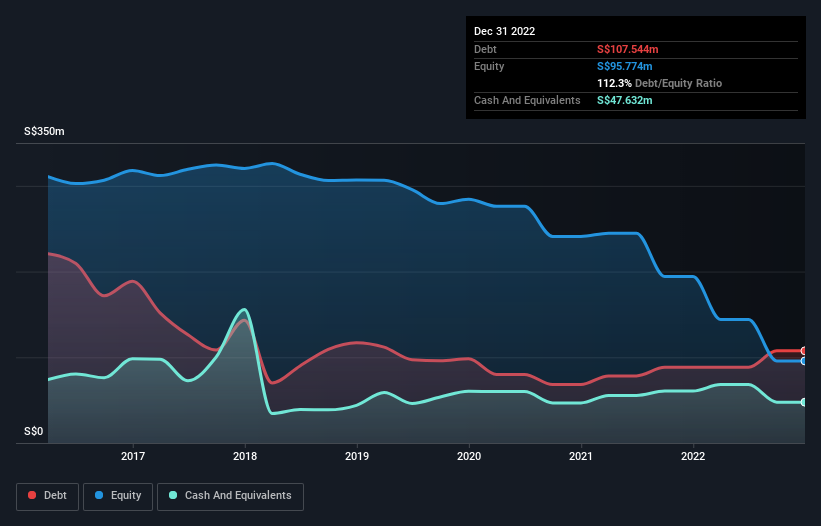David Iben put it well when he said, 'Volatility is not a risk we care about. What we care about is avoiding the permanent loss of capital.' So it seems the smart money knows that debt - which is usually involved in bankruptcies - is a very important factor, when you assess how risky a company is. We note that Tiong Seng Holdings Limited (SGX:BFI) does have debt on its balance sheet. But the real question is whether this debt is making the company risky.
Why Does Debt Bring Risk?
Generally speaking, debt only becomes a real problem when a company can't easily pay it off, either by raising capital or with its own cash flow. In the worst case scenario, a company can go bankrupt if it cannot pay its creditors. While that is not too common, we often do see indebted companies permanently diluting shareholders because lenders force them to raise capital at a distressed price. Of course, plenty of companies use debt to fund growth, without any negative consequences. The first thing to do when considering how much debt a business uses is to look at its cash and debt together.
See our latest analysis for Tiong Seng Holdings
What Is Tiong Seng Holdings's Net Debt?
As you can see below, at the end of December 2022, Tiong Seng Holdings had S$107.5m of debt, up from S$88.2m a year ago. Click the image for more detail. However, it does have S$47.6m in cash offsetting this, leading to net debt of about S$59.9m.

How Strong Is Tiong Seng Holdings' Balance Sheet?
Zooming in on the latest balance sheet data, we can see that Tiong Seng Holdings had liabilities of S$388.6m due within 12 months and liabilities of S$31.9m due beyond that. Offsetting this, it had S$47.6m in cash and S$147.1m in receivables that were due within 12 months. So its liabilities outweigh the sum of its cash and (near-term) receivables by S$225.8m.
The deficiency here weighs heavily on the S$46.3m company itself, as if a child were struggling under the weight of an enormous back-pack full of books, his sports gear, and a trumpet. So we'd watch its balance sheet closely, without a doubt. At the end of the day, Tiong Seng Holdings would probably need a major re-capitalization if its creditors were to demand repayment. When analysing debt levels, the balance sheet is the obvious place to start. But you can't view debt in total isolation; since Tiong Seng Holdings will need earnings to service that debt. So when considering debt, it's definitely worth looking at the earnings trend. Click here for an interactive snapshot.
Over 12 months, Tiong Seng Holdings reported revenue of S$358m, which is a gain of 21%, although it did not report any earnings before interest and tax. With any luck the company will be able to grow its way to profitability.
Caveat Emptor
Despite the top line growth, Tiong Seng Holdings still had an earnings before interest and tax (EBIT) loss over the last year. Its EBIT loss was a whopping S$85m. If you consider the significant liabilities mentioned above, we are extremely wary of this investment. That said, it is possible that the company will turn its fortunes around. Nevertheless, we would not bet on it given that it vaporized S$22m in cash over the last twelve months, and it doesn't have much by way of liquid assets. So we consider this a high risk stock and we wouldn't be at all surprised if the company asks shareholders for money before long. The balance sheet is clearly the area to focus on when you are analysing debt. However, not all investment risk resides within the balance sheet - far from it. We've identified 3 warning signs with Tiong Seng Holdings (at least 2 which shouldn't be ignored) , and understanding them should be part of your investment process.
If you're interested in investing in businesses that can grow profits without the burden of debt, then check out this free list of growing businesses that have net cash on the balance sheet.
Valuation is complex, but we're here to simplify it.
Discover if Tiong Seng Holdings might be undervalued or overvalued with our detailed analysis, featuring fair value estimates, potential risks, dividends, insider trades, and its financial condition.
Access Free AnalysisHave feedback on this article? Concerned about the content? Get in touch with us directly. Alternatively, email editorial-team (at) simplywallst.com.
This article by Simply Wall St is general in nature. We provide commentary based on historical data and analyst forecasts only using an unbiased methodology and our articles are not intended to be financial advice. It does not constitute a recommendation to buy or sell any stock, and does not take account of your objectives, or your financial situation. We aim to bring you long-term focused analysis driven by fundamental data. Note that our analysis may not factor in the latest price-sensitive company announcements or qualitative material. Simply Wall St has no position in any stocks mentioned.
About SGX:BFI
Tiong Seng Holdings
Provides building construction and civil engineering services in Singapore, the People’s Republic of China, and Malaysia.
Slightly overvalued with very low risk.
Market Insights
Community Narratives




